The Clarus Sextet is a six-outlet power conditioner with advanced surge protection. The Sextet’s smaller sibling, the Duet, has been a staple in my system for nearly five years. At the time, the Clarus Duet was the first power conditioning product I had heard that did not restrict the dynamic capability of the high-current amplifiers I love so dearly, like the Bricasti M30 Monoblock amplifiers and the Amped America AMP 2400. This was a keystone moment for me, since it was the first time in my 20 years of listening to, selling, designing and repairing audio equipment that a high-current power conditioner delivered on its promise not to restrict the current, which can easily erode fidelity.
The Clarus Duet was specifically designed for high-current amplifiers, which is its ultimate limiting factor is that it is really best for use with audiophile grade amplifiers especially monoblock ones that only need one power outlet, not six or eight. In 2021, when the larger Clarus Sextet was introduced, Clarus added two power outlets with custom filtering specifically for analog components like a phono stage and preamplifier, and two power outlets with custom filtering specifically for digital equipment like Audiophile DACs and streamers, in addition to the two high-current amplifier power outlets found in the Duet. To be clear, the outlets on the Duet and Sextet are identical however the filtering system and internal patented material inside are unique in the Duet thus specifically designed for use with amps. I choose to view the Clarus Duet as a supplement to the Sextet in that the Duet has such unique design attributes for audiophile power amps while the Sextet offers great protection for amps on its own but also delivers solid protection for other type of audiophile source components.
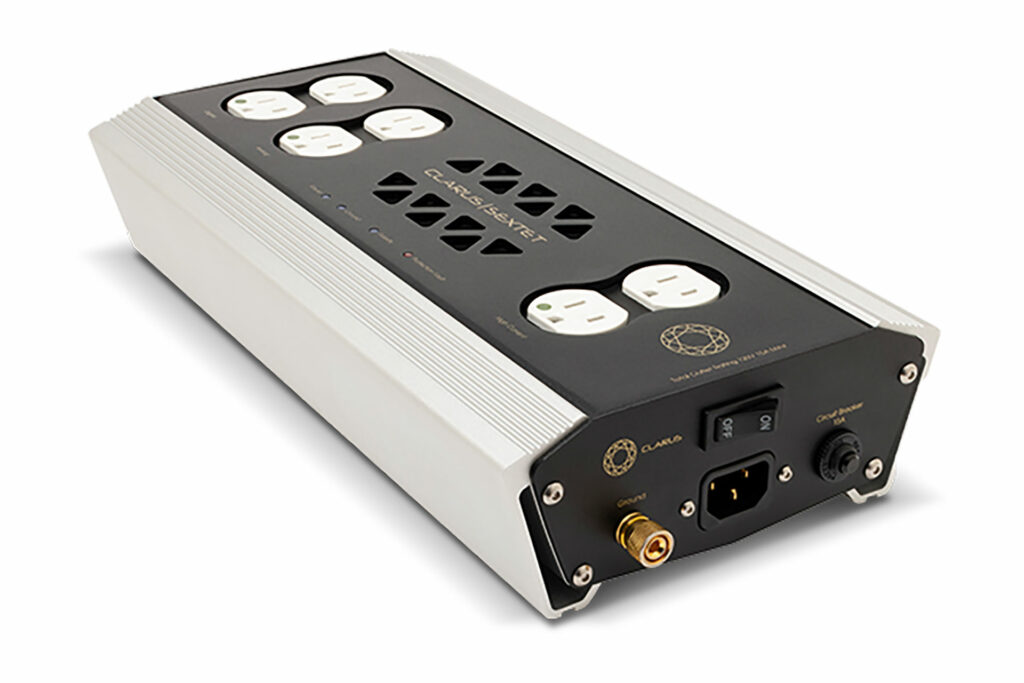
What Makes the Clarus Sextet Power Conditioner So Special?
- The Clarus Sextet is loaded with advanced and proprietary low-noise materials. Power products are difficult to design and often expensive, due to the wide array of filtering and circuitry needed to provide protection at utility voltages and currents. To accomplish filtering and protection without creating a problem elsewhere, Clarus developed proprietary materials used in their C-Core Technology to eliminate the typical complex electromechanical problems that occur, like magnetostriction (link for real nerds only).
- The Thermal Metal Oxide Varistor (TMOV) system that provides the protection in the Sextet can react within microseconds when needed. Power protection products cannot be too sensitive. If they were, every time one turned on the industrial grade blender to make a protein shake and the lights flashed for a split second, protection would activate and shut down your system. It is frustrating enough to have to listen over a whirring blender; now imagine resetting your system multiple times during a listening session. Nearly all other AV power products make sure these normal power hiccups do not shut down a system by utilizing slow reaction time to power blips. This can still allow for a damaging surge before protection kicks in under the right conditions. The TMOV technology in the Clarus Sextet still softens the blow of the everyday, normal power blips, but is always monitoring for dangerous power anomalies. When the TMOV-based system detects a threat, it can instantaneously ensure protection is given to an entire system. This speed goes a very long way when protecting sensitive, and often expensive, equipment.
- Protection occurs everywhere in the power stream within the Clarus Sextet. The ground, neutral and power wires are all protected, as well as the interactions between them.
- All of the outlets in the Clarus Sextet are hospital-grade. Hospital-grade means they conform to UL laboratories standards for reliability, longevity, and connection for sensitive equipment. These aren’t cheap parts, and for good reason. The small benefits that they can bring to an audio component tend to add up to deliver meaningful results.
- The Clarus Sextet shares the same noise filter technology as Clarus’ flagship power product, the Concerto.
- The Clarus Sextet contains useful information LEDs, and a small form factor that is designed to fit anywhere, instead of taking up rack space.
Why Should You Care About the Clarus Sextet Power Conditioner?
Since 2013, Clarus President, Joe Perfito, has worked with the legendary power and signal expert Jay Victor (Pangea, Tributaries – among others) to develop top-tier cables and products that provide a strong value. Clarus provides this value by aiming to compete with the oligarch-level power and cable products through keen engineering in the areas of the product where it makes the most profound impact. I found this formula to work when I first auditioned the Clarus Duet and was blown away by its performance.
Now we have the $2,000 Clarus Sextet, which is a strong middle ground between their $4,000 Concerto, and $1,250 Duet, and it has all of the advanced technology used in both. My only frustration with the Clarus Duet has been that I cannot provide the clean power and specialized filtering to the rest of my system that I do to my amplifiers. The added capability of the Clarus Sextet now makes it possible to protect and filter all my components without limitation. Further, at only $750 more than the Clarus Duet, the Clarus Sextet is still an affordable power product that would be a one-time, fully functional purchase for most high-end systems.
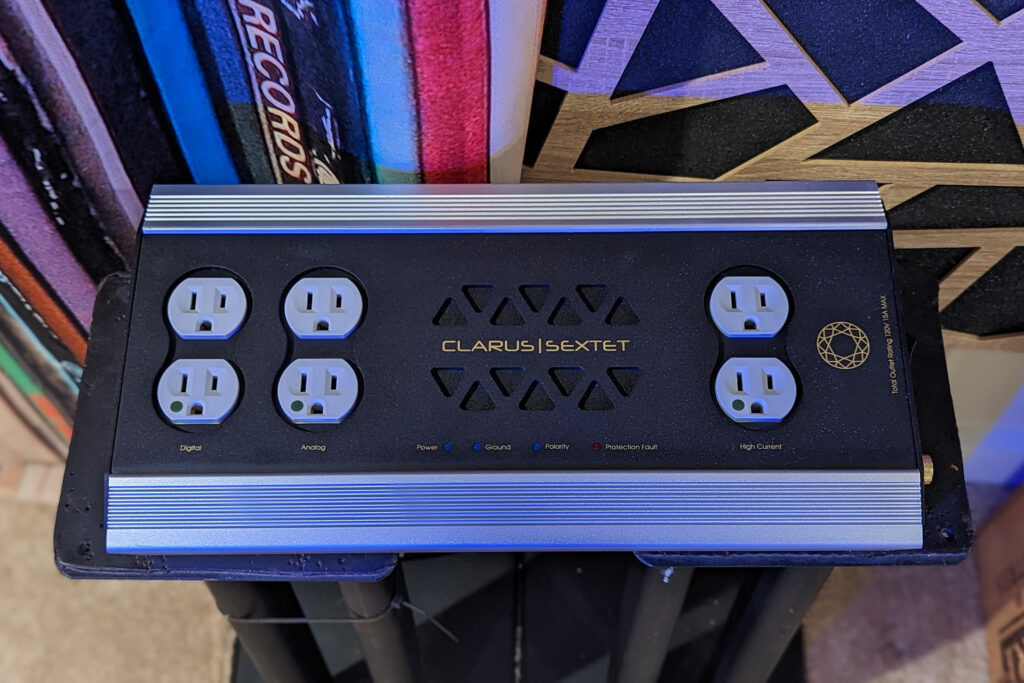
Some Things You Might Not Like About the Clarus Sextet Power Conditioner
- While advanced, the protection in the Clarus Sextet cannot be user reset however the temperature sensitive MOV will actually reset on its own when a unit in distress comes back down to an acceptable temperature. In a truly catastrophic power even such as a lightning strike, the unit is going to give out and that is the right thing for it to do. More often than not, a trip back to the factory can get the unit reset even in a major power event.
- The compact power-strip-like format may not be for everyone. Our publisher, Jerry Del Colliano, has a closet with a professional eight-foot-tall Middle Atlantic rack system in it for his audio gear, home theater, smart home control distributed music, and more. This system configuration makes the physical format of the Sextet to be really complicated. A standard-sized AV component like the Clarus Concerto may be a better option in this case, or in other more structured audiophile installations.
- The indicators on the Clarus Sextet have small print. When walking through a health check of one’s system, it may be difficult to see the indicator lights and know what they mean if the Sextet is placed behind an audio rack, like it is in my system.
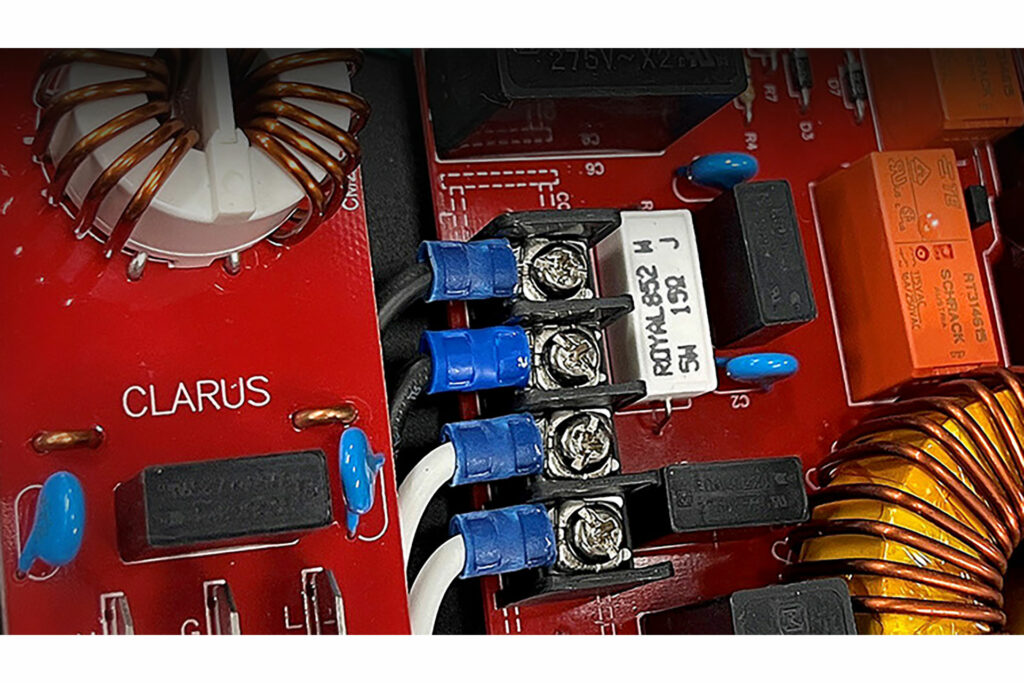
Listening To the Clarus Sextet Power Conditioner…
I cannot speak to the practices of other audio journalists’ auditioning methods, but I like to employ discipline and rigor to my evaluation of any component. Any change to my main listening system is easily resolved by my Bricasti Design electronics and PSB Synchrony T800 loudspeakers. In order to make sure I classify the change into better, as good but different, or worse, there is a lot of listening that needs to happen, with one small change made at a time. In this spirit, my first step was to swap in the Clarus Sextet for my Clarus Duet, using only the high-current plugs like the Clarus Duet has, to ensure there were no audible changes to the sound. Luckily, nothing did change between the Clarus Duet and Clarus Sextet, which was a great start.
After that first test, I began plugging in one component at a time into the correct analog and digital outlets, listening carefully over the course of weeks to each subtle change. One change, or lack thereof, was with my Bricasti Design M1 Series II DAC. I found perhaps the day-to-day variation of my winter sinuses might be more significant than any sonic impact the Clarus Sextet had. I felt this inconclusive change was good, since it means the Clarus Sextet did not remove anything from the sound, but now I can sleep better, knowing I have advanced surge protection for my DAC.
Otherwise, as I loaded up the Clarus Sextet with the remainder of my system, I did find a significant, overall improvement to the spatial imaging, and subtle inner details of the sound. These changes are what I would expect, since the conditioning is on the line power side. Spatial and detail improvements are due to a lowering of the noise floor in the very power that feeds each component. Once the Clarus Sextet was fully integrated, I began the long and tedious process of change again, swapping the power cords in my system for both the high-current and standard versions of Clarus’ award-winning Clarus Crimson Power cables. My audio system now had Clarus power products from the wall, through the Clarus Sextet, and to each component. Evaluating cables can be difficult, and while this should be no surprise that my reference system was at a higher level with all Clarus power products present, I did revert back to my standard power cable set-up with the Clarus Sextet to focus only on the difference being made by it. And the difference with the Clarus Sextet in my system was certainly positive.
If you are looking to trigger the audiophile community, state that one particular remaster of a Led Zeppelin album is better than one of the countless others. Now, I am not here to stir the pot in regard to what recording is best, but to simply state that in the context of what I enjoy, “Since I’ve Been Loving You” from Zeppelin X Zeppelin is my preferred rendition of a song from the time Led Zeppelin was throwing down some excellent British Blues. I especially enjoy the 24 bit/192 kHz version of it on Qobuz. I found the Clarus Sextet to flesh out and anchor subtle musical nuances better, which made a non-trivial difference in the whole musical picture. Some examples of this are the squeak in the bass drum pedal, as John Bonham authoritatively anchors the song, the subtle finger work on Jimmy Page’s guitar during soft passages, and Robert Plant’s throaty vocals during the musical pause three-quarters of the way through the track. I also found there to be a nice sorting out of instruments in the soundstage that the Clarus Sextet helped resolve during the huge climax of the song right before the ending.
Twenty One Pilots “Car Radio” comes from their album Vessel. The duo of Tyler Joseph and Josh Dun has an extremely eclectic and unique sound to their music that is unmistakable. The Clarus Sextet help to extend the ambient effects of “Car Radio” well outside the walls of my listening room, while the percussive effects seemingly faded into deep blackness after the initial dynamic attack. Both of these enhancements are related to the Clarus Sextet’s ability to lower the noise floor. I was entertained by this, because every time I think I understand what a dead quiet low-noise floor is, companies like Clarus are always finding new ways to make it lower with products like the Clarus Sextet.
I also found an enhancement to the pace and rhythm during this song that was brought about by the Clarus Sextet. It was as if the emphasis on the one and four beat of the song was a little more fleshed out. Subtle, but it made a big difference in terms of apparent impact to the sound. In a similar manner to “Since I’ve Been Loving You” above, I found the Clarus Sextet to help keep the integrity of the music sorted out during intense, dynamic passages. Overall, the Clarus Sextet really helped the subtleties in “Car Radio” to get my blood boiling.
Seeing that I was enjoying the subtle improvement the Clarus Sextet was bringing to my system, I slowed the music down, and softened it up a little with Alison Krauss’ “Baby, Now That I’ve Found You” from her release Now That I’ve Found You: A Collection. While listening with the Sextet in my system, I was melted with the enhancements to Alison Krauss’ tender voice. The silent background allowed a better understanding of the quiet guitar work. There was a continued theme as in the other two examples found in “Baby, Now That I’ve Found You” brought about by the Clarus Sextet. This theme occurred during the dynamic duet in the final chorus, when Krauss is joined by a male vocal harmony. The richness created, then preserved, by the Clarus Sextet from their individual voices etched in space, while simultaneously interacting with each other, raised the hair on the back of my neck. Well done, Clarus.
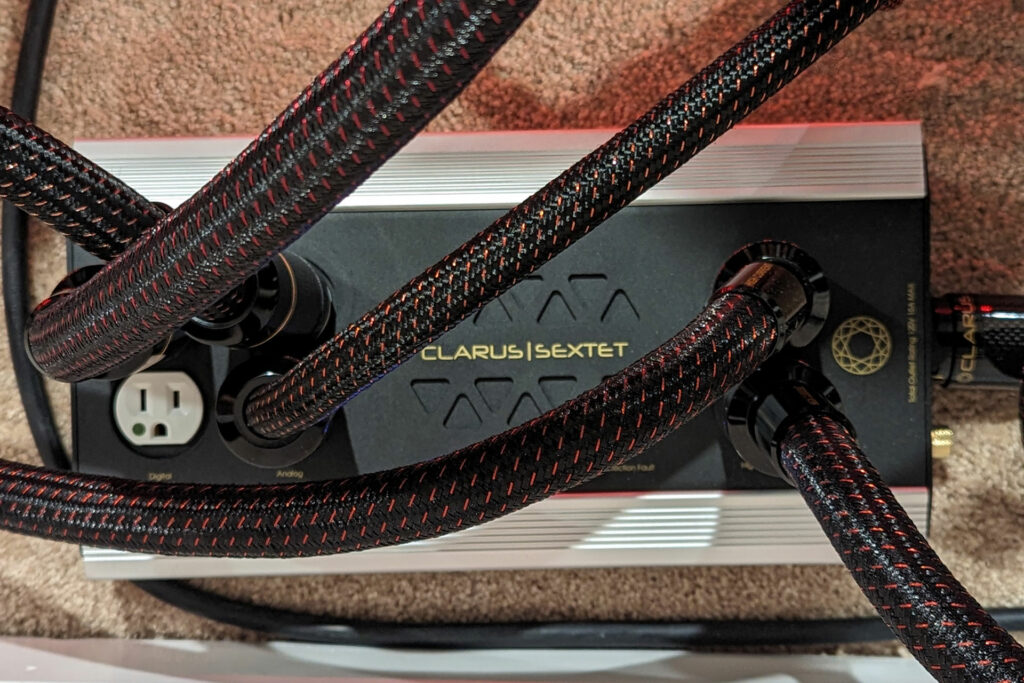
Does the Clarus Sextet Power Conditioner Have Any Resale Value?
Clarus power conditioners do not often show up in the used market. When they do, they are snatched up pretty fast. Recently, an old friend of mine upgraded his system to monoblock amplifiers from an integrated amp. He was looking for a power solution. I advised him to look into the Duet, and he did find one for sale in the used market for 45 percent off. It was a great score, but it was the only one he could find and it took about two weeks of looking for it to pop up. I think this is a good sign that the Clarus Sextet will have a strong resale value, but those who buy Clarus products tend to keep them.
Who Is the Competition for the Clarus Sextet Power Conditioner?
- $2,195 buys you into the Transparent PowerWave Power Conditioner. The PowerWave will get you a rack-sized component, as well as two additional outlets over the Sextet while utilizing Transparent’s own protection and conditioning circuitry. The PowerWave seems to be a little more home theater-focused, with Gigabit connections and coaxial protection/filtering, whereas the Clarus Sextet is purely focused on the highest-quality protection for dedicated music systems.
- Richard Gray’s Power Company is a longstanding name in audiophile system power conditioning and protection. Richard Gray’s Power Company RGPC 1200 Custom ($2,370) offers double the number of outlets that are on the Clarus Sextet, can be rack-mounted, and is a handsome piece to display. However, Richard Gray’s Power Company has never been very transparent about their technology and operates in the “just trust us, it is good” realm of audio gear.
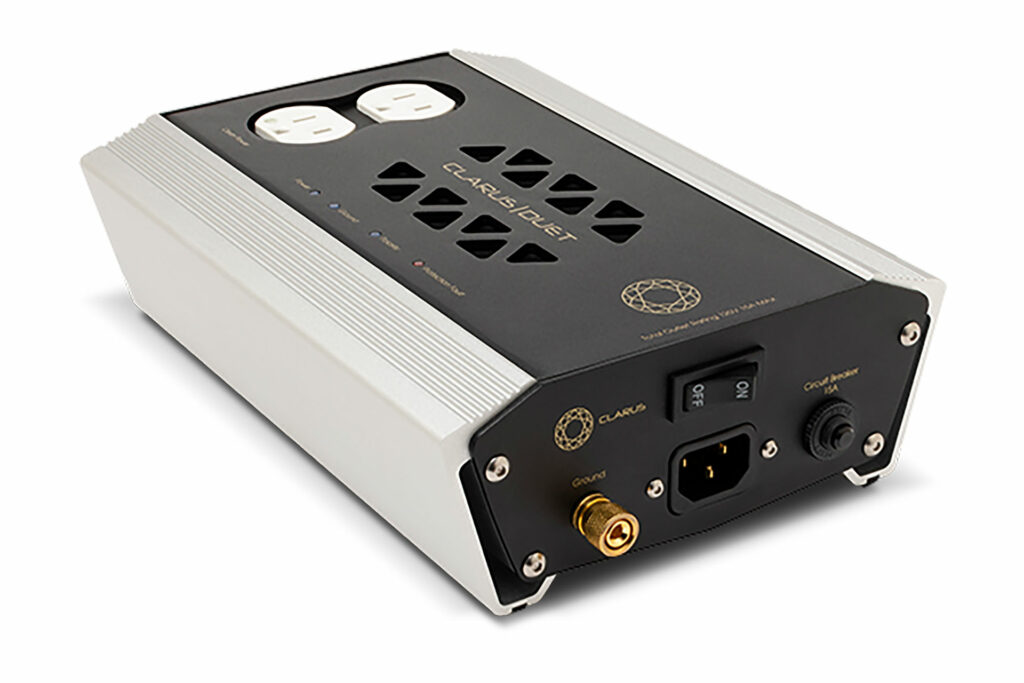
Final Thoughts on the Clarus Sextet Power Conditioner…
From my experience with the $2,000 Clarus Sextet, it seems Clarus has once again accomplished a high-value power conditioning product at a more attainable price for moderate-level audiophile systems. The Clarus Sextet is a very logical and worthwhile upgrade from the Clarus Duet I already have in my system, without robbing from the value of their $4,000 flagship power conditioner, the Clarus Concerto. Though a little clunky in form factor, the Clarus Sextet would be a nice addition to any moderately-priced audio system, providing ultra-fast protection of components, while not restricting current delivery to those same components. The filtration certainly provides not just a detectable, but an obvious improvement to the soundstage and inner details of the music. Anyone in the market for a high-quality power conditioner with advanced protection should consider the Clarus Sextet.




I was already using a Surgex conditioner for my 2-channel set up, the Surgex worked better, sounded better than my PS Audio Quintet. A dealer loaned me a Clarus Duet to play with. I had already sort of disregarded it because I had a dedicated 20 amp line and it sounded crazy to use a 15 amp device from a 20 amp outlet. However, the Duet was noticeably better than what I already had. Whatever they put in those boxes seemed like it super charged my amplifier, in addition to quieter background. I ended up getting the concerto so I could input all of my 2-channel components into it. Plugged into the appropriate outlet of the Concerto my Mark Levinson amp exhibited better PRAT. I was satisfied at the time I tried the Duet trying the Clarus it sold itself with the results.
Hi Bryan, Glad to hear you had a good experience. I think like many other components, Power conditioning is reaching a higher state of maturity from companies like Clarus. That are engineering ways to overcome the normal shortcomings of filters that disturb the critical AC components of the electricity that cannot be disturbed like power factor and frequency. These advancements allow the filtering AND protection to do its job without having the detriment of hurting the sound in other ways.